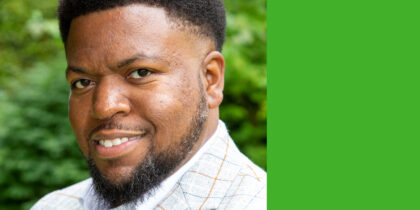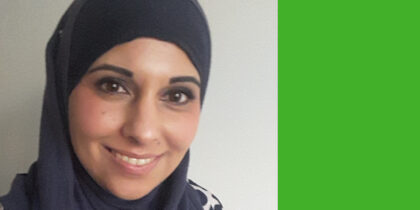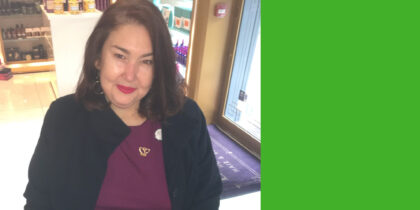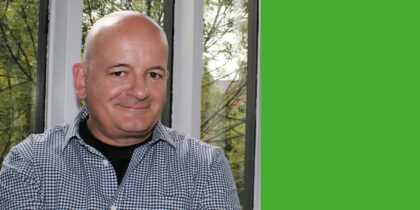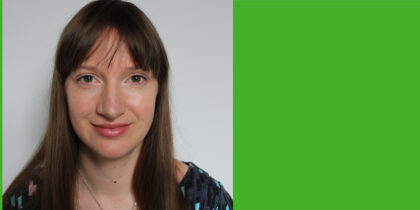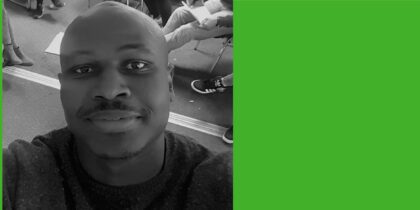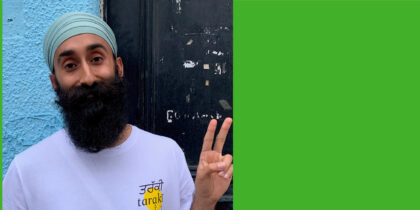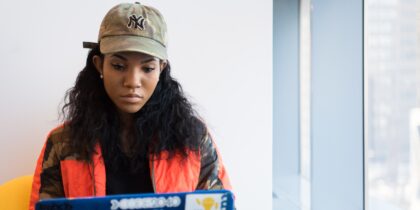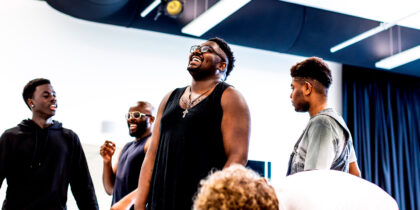Thea Joshi hears from Amarno Inai and Androulla Harris about their recent work on Shifting the Dial, evaluating a Birmingham-based project to promote young Black men’s mental health. In light of the risk factors facing Black men’s mental health, they explain how community-based, culturally informed spaces for young Black men have made a massive difference. They also discuss the way peer research shaped the evaluation, and the need to decolonise research.
Listen to the episode on Spotify or iTunes. The full transcript is available below.
Show notes:
- Read our report, Shifting the Dial, about the evaluation Amarno and Androulla worked on
- Download a summary of the report
- Listen to our podcast with Alex Augustine, one of our peer researchers who worked on Shifting the Dial
- Listen to our podcast with Nathan Dennis, founder of First Class Foundation, one of the partners on Shifting the Dial
Music by scottholmesmusic.com
Transcript
Alethea Joshi (AJ): Hello and welcome to Centre for Mental Health’s podcast, where we explore ideas around mental health, equality, and social justice. I’m Thea Joshi, and on the podcast we talk to people with lived experience of mental health problems, or those working in a specific area, about engaging in the fight for equality in mental health.
This month I sat down with Amarno Inai, one of our peer researchers, and Androulla Harris, our senior researcher, to discuss our evaluation of a project in Birmingham to boost young Black men’s mental health. The evidence is clear that young Black men are more likely to end up in restrictive mental health settings, but less likely to get effective early help.
Androulla and Amarno explain the work we’ve been doing alongside amazing partners in Birmingham to explore how community-based, culturally informed spaces for young Black men can make a difference in terms of mental health, but also more broadly in building hope for the future, and a sense of belonging and being heard. They reflect on the role and impact of peer research and participant observation within the evaluation, and on the need to decolonise research.
Today I’m delighted to be joined by Amarno Inai and Androulla Harris. Amarno is one of our peer researchers and Androulla is one of our senior researchers at the Centre. Hi, guys.
Androulla Harris (AH): Hello.
Amarno Inai (AI): Hi.
AJ: It’s so great to have you guys here. We’re going to be chatting about some of our latest research, which launched last week. So yeah, I’m gonna dive right in. So our latest report Shifting the Dial launched last week and it’s the evaluation of a three year project of the same name. And we’ve been working alongside partners with young Black men in Birmingham to build their mental health and resilience. So I’d love if you guys could just tell us a little bit more, share a bit more background about the project?
AH: Yeah, sure. So at the Centre, we worked on an evaluation prior to this one, which was called Up My Street, which was working with many of the same projects. They’re all projects specifically designed to help young Black men with their mental health in Birmingham. And that evaluation found that the projects were successfully helping young Black men and we really wanted to see longer term the effect that this was having. So we were lucky enough to get more funding to look at this over a longer period of time. And an area that we’re really interested in is that young Black men face multiple mental health inequalities. And we know that they have bigger risks, for many reasons, but these include experiences of racism, discrimination, and trauma. And we think it’s so important that their needs are really brought to the fore, because they are so often overlooked or misunderstood.
AI: Yeah, so following on from what Androulla said, I was involved with the projects, but as a peer researcher. The Shifting the Dial project was in partnership with Birmingham & Solihull Mental Health NHS Foundation Trust, The Rep, Light Post Theatre, and First Class Legacy [now First Class Foundation]. Now, as a peer researcher, it meant that I could essentially add a bit of a dimension to the research, because I personally am somebody who was affected with poor mental health, also a Black male, between 16 and 25, and I got involved with First Class Legacy through trying to create a project around Black male mental health myself. And then through going to First Class Legacy, I got to know Centre for Mental Health, they liked my responses, as I was doing their evaluations, and they approached me about becoming a peer researcher. So yeah.
AJ: That’s great to hear. And it’s interesting because I feel like this is a theme that keeps coming up in our podcast episodes about this idea of needing to hear from the people who have the lived experience and needing that lived experience to shape all of our research. I know that that’s something we’re really passionate about at the Centre. And I’ll link in the show notes to our podcast a few months ago with Alex Augustine who’s another one of our peer researchers, who talks a lot about this subject and the need for really harnessing lived experience and not doing to people but working arm in arm with communities. So it’d be great hear a bit more about what was the Shifting the Dial project really setting out to achieve in Birmingham?
AH: So Shifting the Dial aimed to improve the resilience, mental health and wellbeing of young Black men in Birmingham. And the ways that it achieved this was through creating a safe space, safe spaces where young Black men could express themselves, whether that be through drama, or workshops, mentoring opportunities. And, yeah, also, it was important to build up certain skills like young men’s confidence, and also helping to support and develop their aspirations for the future. And yeah, we found that the projects did have a good level of success in these areas. And in our methodology that we developed with peer researchers we were measuring this in different ways. So it was mainly through focus groups, interviews, and also participant observation, where peer researchers were really immersed in what was going on in the different projects and were able to observe and write their own first-hand accounts of the experience of being in these spaces, what it felt like to be there, and what were the outcomes for the young men who attend.
AJ: Thanks, that’s really helpful to hear. And I think especially as you were saying earlier, this project comes off the back of the pilot project we did Up My Street. I think that really highlighted to us, as you say, how overlooked young Black men have been in a lot of areas of policy and services provision. And we know that there’s no evidence of a genetic or cultural difference between ethnic groups that accounts for different mental health outcomes. And yet, we’re seeing that four times as many Black people are sectioned under the Mental Health Act as white people from the latest NHS data. And also that 10 times as many Black people are given community treatment orders when they leave hospital. And so my understanding is that, you know, the aim of this project is to say, what’s going on there? How can we boost and build the mental health of young Black men to try and address, in part, the disproportionality we’re seeing within mental health services, and Black men getting the support that they need? So it’d be great to hear a little bit more about the projects that were involved in Shifting the Dial and what they were setting out to do. So I know, we worked with First Class Foundation, and also with The Rep and the Light Post Theatre. Could you guys tell me a little bit more about the different projects and how they worked?
AI: So I worked with First Class Foundation. I first was a participant and became a peer researcher. Mostly, what was very unique about being at First Class Foundation and getting involved with the participants, firstly, was the atmosphere and the way that they created an environment that was quite homely. In the first hour, they would feed you with like cultural foods that we all knew and love. So most of us who are involved as participants are Black Caribbeans/Africans, but mostly Black Caribbean. So we were served with Caribbean food, sit down and eat and talk – nothing too heavy, it was literally just a casual conversation. Then from there, we moved into a, let’s call it a living room space, it was literally like a living room, fireplace, big, nice leather seats, etc. And we sit in a circle, and then we will talk about possibly two or three topics around mental health or how we felt for the week or the month. And then we just share each other’s experiences. And from the initial apprehension some of us had with sharing, from when one would share, as they was more comfortable, especially with the space, then others would get more comfortable and share. And I think what’s important for me is that it didn’t feel like I was being questioned as a patient, I felt like I was being questioned by family members, or brothers. And I think that’s the unique part of it and what sometimes we lose when we work in these mental health organisations, is that, of course, you have to keep that level of separation from us as a patient, but sometimes we can lose the human element. And that’s what, for us as young Black men, or just as people in general, we want that human element, you want to be able to connect with the person and understand, you know, feel the empathy. And especially when the facilitators, in this case it was Nathan Dennis and Nathan Shillingford, shared their own experiences, it meant that, okay, we weren’t subjects, we were actually having a human conversation. And I think that’s where the power comes from.
AJ: I just love hearing about that. And I will also link to a podcast we did with Nathan last year where we talked more about that. But it’s so exciting to hear about the way that project works and how it’s meeting people that aren’t generally often being met by sort of “mainstream services”. And I think there’s so much there for NHS, statutory services to learn from in terms of, as you say, that human element, that sense of humanity, relating to someone as a person and not a patient, and also the value, the massive power of sharing our own experiences and our own vulnerabilities. And it’s so exciting, and I just wish we were seeing more of that across the country. So I’m excited that we can share the impact of that through this report. I know that The Rep and the Light Post Theatre were also involved in this. What were they doing as part of Shifting the Dial?
AH: Yeah, so the Light Post Theatre, as far as I know, is the only drama group in the UK that is specifically for young Black and Black mixed-race men. And it’s a group that meets frequently to develop ideas for productions that they create together. And a lot of them are to do with themes around Black heritage and Black identity, and the struggles and discrimination that you will unfortunately face as a young Black man living in the UK. There’s also a strong sense of belonging that comes from being a part of this group. So it’s about acting, but it’s also a lot more than that. It’s about creative expression, the feeling of belonging and safety. Being in a space where, something that we repeatedly heard from the young men, that it was a space they felt they could truly be themselves and express themselves, whether that’s, you know, joyful moments, but also difficult moments. So, there are some areas in which Light Post Theatre and First Class Foundation, Dear Youngers are quite similar and that’s why they were grouped together.
AJ: Yeah, that’s something that really came out in the report and the evaluation. I saw that in both First Class Foundation and Light Post, when the pandemic hit, as hard and difficult as that was, there was a real sense of that kind of brotherhood and family that remained throughout. That people felt that, you know, it wasn’t just say, a theatre group or a group of people, but it was a real kind of family and sense of caring and, again, that theme of brotherhood that seems to have made such a massive difference. I’d love to know a little bit more about why do you think that these projects were so powerful, and had such a major impact on the young men involved?
AI: I think from my First Class Foundation perspective, it was that a number of the participants knew each other already. So there was some kind of camaraderie there. Now, the ones who were new, including myself, who had entered the space, we immediately felt welcome. Even if we was not sharing, we felt welcome in the space. As I mentioned, it was more comfortable, they had food. And as I said, they didn’t treat us like participants, they treated us like friends or brothers or family. And they didn’t pressure us to come with an answer, or to share. It was even if it meant that you just sat in the space and just listened, then that was fine. And then it was the fact that the facilitators didn’t just end the conversation after the meeting, they would keep regular contact, which is what we saw at Light Post as well – the participants fed back and said, you know, when we was down, they would also give us a WhatsApp message, or they would email us or give us a call. They had an open-door policy on both projects. And so they didn’t really feel like it was just that space, they felt like there was a continuity there.
AH: I think that the projects were so successful because being part of a group made up of Black people, made young people feel more comfortable. And on top of that, sharing common interests was really important for creating unity and belonging. And it was really great to see the growth that the young men who attended the projects saw in themselves. You can read more in the report, but one main theme which came out was seeing a positive future for yourself. So it seemed like a really important way that young men’s dreams and aspirations were supported is from the brotherhood, being able to talk about their dreams and their goals and, you know, barriers they’re facing together with their peers. It really helped boost the confidence of the whole group in both cases.
AJ: That is really helpful to hear and I honestly feel really excited hearing about this because it’s so exciting to hear that projects like this are taking place and I am really hopeful and really trusting that health care providers will be reading the report, reading the findings and really thinking, how can we make a service that meets people more where they’re at, to really take hold of and learn from the findings and learn from the good practice that we’ve seen in First Class Foundation, in Light Post. So, Amarno, I was wondering if you could tell us a little bit more about your role as a peer researcher within the project? What was that experience like for you? What were you doing?
AI: Well, I was approached to be a peer researcher, I believe on the back of engaging with one of the meetings at First Class Foundation. So they was looking for peer researchers to provide, I would say, cultural context to some of the data. Because there would be certain things that we would say that only us as Black men or as Black people would understand implicitly. So one of the things that I raised in the writing or the literature was about the silences, or finishing sentences with “you get me” or “you know what I’m saying”. Now, for us, from my experience anyway, all we have to do if we say “you know what I’m saying” is look at each other in the eye and, somehow, we know by the end of it what we was trying to say without finishing a whole sentence. What’s another thing that was interesting? Yeah, I just think it was about the cultural context, just the nuances of things, just being in the room, as somebody who has both lived experience of being Black and of Black culture, Black Caribbean culture, it meant you just pick up on the nonverbal cues. And then it was about translating that into literature, which was quite interesting. It was like being on the outside while being on the inside because it meant how do I translate these types of “cultural norms” to somebody who’s not in there so that it can be, in a sense, read universally by anyone who picks it up? So yeah, I think being a peer researcher kind of added to making people feel comfortable or the other participants feeling comfortable and not feeling like a subject, again as I mentioned, because it meant that I had a stake in making sure that their voices were heard and it was told fairly, and not in a way that was exploitative.
AJ: Yeah, I think you’ve hit on something so vital there Amarno about that thing of it not being exploitative. And I’m sure we could talk about this for hours, this idea of kind of trying to decolonise research and recognise the white supremacy and the way that has embedded itself within western research so that we’re not kind of exploiting people for findings, but we’re actually working arm in arm with a genuine, authentic approach that recognises people’s humanity. And, again, that’s not like doing research to people, but is really hearing their perspective.
AI: Yeah, I think that’s an interesting point that you made about decolonising research, because I feel that living in the West, it’s like we approach human behaviour, and human relationships and experiences from a highly intellectual level and not from a space of empathy. We see people as the object rather than a subject that will have complicated feelings and emotions and lived realities and lived experiences. And if we compound that with racism, historically we’ve seen Black people as an object, and as somebody who’s the other, as barbaric or just bestial then. And then, if we make that specific to Black men, we can see that in medical research and how, you know, the way we can explain Black aggression is because they come from the jungle or whatever, or crimes because of the colour of their skin or, you know, instead of addressing the social, political and economic realities that certain demographics of Black men or Black people face, and is a reaction to that. Whereas, as we’ve seen, the statistics of how Black people, particularly Black men, are brought into the mental health system, you see that permeate them. And how we deliver research and how we deliver solutions, mostly it will be harsher or [we will be] treated with less empathy than our white counterparts. Maybe that might go back to political and philosophical thinking by, you know, those guys that basically just see the white man as the most intellectual and that he deserves to be treated with respect and dignity, and he’s just down on his luck. And that’s the same experiences as white women have historically been treated with as well where they’ve been seen as the object. So it seems like, essentially, the white man is the one who’s the most human, because he’s the most intellectual and deserves to be treated with respect and you know, has to be helped. Whereas us, whether it be white women, or Black women, or Black men, or the Black community or the “other”, don’t get that same grace and mercy.
AH: Yeah, I think that the peer research aspect of this project and the way we’ve designed it was really, really vital, and that the evaluation couldn’t have taken place without it. We didn’t want to come in as white researchers and do research to the young men taking part in these projects in Birmingham. We thought it was so important to recruit peer researchers from young men such as Amarno, who actually were already embedded in these projects, and to work with them to really co-design how the research should look. You know, are we even asking the right questions? What questions should we be asking? How should we be asking those questions? And working with Amarno and other peer researchers has been so crucial to improving the engagement that we’ve had with participants. I think that the authenticity that they bring to discussions, you know, including really important issues like racism, and the kind of instant rapport that can be developed when you’re speaking to someone from a similar background to yourself, similar age group, similar location, all these things just really helped to build up that trusting rapport really quickly. So yeah, it’s been a real success using the peer research methodology. And we just recommend that other projects, maybe if you haven’t used peer research before, do look into it because it’s such a worthwhile and underused method.
AJ: Yeah, that’s such helpful context. And again, we really hope that researchers and research bodies will be listening to this and thinking about where can we learn from this? And do check out the report for more on that. So as we said, at Centre for Mental Health our role was to evaluate the project and explore its impact and all of those findings are in the report, which obviously we’ll link to. But for you, what were some of the key things that you found from the research?
AH: I’d say the key finding from the report is that the Shifting the Dial programme enabled young men to boost their wellbeing, gain confidence and learn new skills. And this was particularly important because the pandemic occurred during this period so it was a period of extreme adversity. And also traumatic incidents such as the murder of George Floyd, you know, we know that that is one of many, many, many similar traumatic incidents that have been happening over centuries but I also want to refer to that incident because it did leave a lot of young men feeling very traumatised. So the sense of belonging and support that they could continue to rely on from these projects. And, you know, being encouraged to vocalise their feelings about their mental health and wellbeing, for many, that was a real lifeline at this time.
AI: Yeah, I would agree. I think when I was doing the peer research for First Class Foundation, we had touched on the subject of George Floyd briefly. A lot of them didn’t want to speak about it because they were still processing it. Some of them were more cynical about the issue, both the incident and the protests that were subsequently happening. Some of them felt like there was no point, there was nothing else they could do, it would probably just be swept under the rug. Another one mentioned that they were very angry and very frustrated and didn’t want to pacify it and forgive or just have it swept under the rug, they wanted to express that they was feeling frustrated and feeling like that they wanted to just burn stuff down, basically. And then, funnily enough by somebody in the group sharing that, then the others felt more comfortable in at least saying that, you know, it does bother them, but we still haven’t processed it yet. So I think in tying that in, I think having that continuity of the same members or also having participants that are comfortable enough in the space to be able to share, and at least one of them being able and comfortable to share kind of inspires the others. And they know that it’s coming from a space of, I don’t know, friendship, I would say. And I think it’s about the emotional intelligence of the facilitators as well to know when not to speak and just let the participants reel off and not interrupt or give them so many prompts – giving prompts, but not so many that it kind of steers them into an emotion or tries to explain away how they’re feeling.
AJ: Yeah, 100%. And obviously that takes a lot of skill, a lot of expertise to manage that conversation and really, well, to facilitate that conversation in a way that really enables young people to actually express and to process what they’re going through. So, looking ahead, what I’d love to know is, you know, we’ve made recommendations within the report, but what would you say is the key thing that you want decision makers, services, politicians, whoever else, to take away from the research that you’ve done? What is it that you want to see change?
AI: We’re calling for the Government, the NHS, and charitable funders to take steps to boost young Black men’s mental health. I believe this must include tackling racism and racial justice. And I also think it’s about taking action to address the specific injustices faced by young Black men across health, education, and employment justice systems as well.
AH: Yeah, I agree completely. And also that the Government needs to take action on the causes of poor mental health among young Black men. And this will be really important as they work on the forthcoming cross-government Mental Health Plan. We think it’s really crucial that young Black men are meaningfully engaged in the development of the plan so that their interests can really be at the heart of it. And as always at the Centre, we’re always recommending that the Government should be led by the most robust evidence.
AI: And I think I would add to that, to say that there are so many organisations that are at local and grassroots level, who are already doing amazing work with a fraction of the funding that major organisations are doing but are not producing enough impact and value for money. So by Centre for Mental Health working with organisations like First Class Foundation and Light Post, we’ve proven that to reach and engage groups is to work with those local groups that are already doing the work. And we can see this in other sectors anyway, that it’s a wider discussion about providing systematic and consistent funding to local organisations. And you can see the adverse effect that austerity has had on local organisations and you’ve seen how it’s had wider negative impacts both in the inner city and nationally, both for young people’s prospects and their mental health. And I think if we’re going to change society, both set it back to where it was, and also to quote Boris Johnson, “build back better”, we have to bring these local organisations and organisations like Centre of Mental Health into these conversations at policy level to say that the research is there, the people are there, you just need to bring the money and bring the political will to make things happen. So that’s what I would say.
AJ: I think that is the perfect note to end on Amarno. Thank you so much. Thank you, Androulla for sharing your insights in this. It’s been really great to hear more about the project, the evaluation. And obviously all of this is available on our website. I’ll link to it all but for now, I just want to say thank you guys, it’s been great hanging out.
AH: Thank you, Thea.
AI: Cool, thank you.
AJ: I really hope you enjoyed hearing more about this vital work. You can find lots more on our website about the fight for equality in mental health, and specifically on racial justice. We rely on donations to carry out our work, so if you’d found this useful, please support us at www.centreformentalhealth.org.uk/donate. Take care and see you next time.






